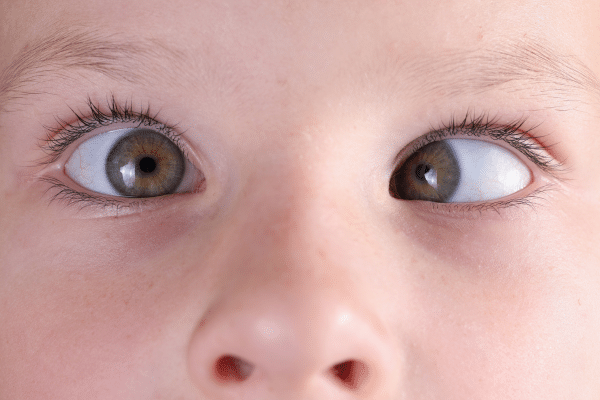
Pediatric Eye Muscle Surgery & Strabismus Care in Illinois & Iowa
Eye alignment problems in childhood can hinder visual development and impact confidence. Specialized care for strabismus, including eye muscle surgery, is available to correct misalignment, improve binocular vision, and support overall eye health. Eye Surgeons Associates’ pediatric ophthalmology team in the Quad Cities specialize in tailoring treatment to each child’s unique needs and developmental stage.
How Does Strabismus Impact My Child’s Vision and Daily Activities?
When your child’s eyes are not aligned, the brain receives two different images. This can lead to reduced depth perception, double vision, or a noticeable eye turn inward, outward, upward, or downward. Many children with strabismus avoid activities that require hand-eye coordination, struggle to focus while reading, or feel self-conscious about the appearance of their eyes. If strabismus is not treated early, the brain may begin to suppress the vision in the weaker eye, increasing the risk of amblyopia (lazy eye) and long-term vision challenges. Early diagnosis and treatment support healthy visual development, improved learning, and improved confidence in social and physical activities.
What Are the Symptoms of Strabismus in Children?
Strabismus is often noticed when one of the eyes appears to drift or point in a different direction than the other. This misalignment may be constant or may come and go, especially when the child is tired, ill, or focusing intently. Some children might squint, tilt, or turn their head to try to use their eyes together, or close one eye in bright sunlight.
Other children may experience double vision, reduced depth perception, or difficulty judging distance. In some cases, a child may not complain of vision problems at all because the brain begins to rely more heavily on one eye, which can lead to amblyopia (lazy eye). If you notice your child’s eyes wandering inward, outward, up, or down, or if they seem to struggle with tracking objects, reading, or coordinating movement, it’s essential to schedule a pediatric eye exam to evaluate for strabismus.
Treatment Options for Pediatric Strabismus
Not all children with strabismus require surgery. Prescription glasses or prism lenses may help correct visual imbalance, while vision therapy and eye-strengthening exercises can improve coordination between the eyes and brain. If amblyopia is present, patching or targeted visual activities may strengthen the weaker eye when these non-surgical treatments do not fully correct the alignment; pediatric eye muscle surgery may be recommended. This outpatient procedure adjusts the eye muscles to restore proper alignment, and most children recover quickly with minimal discomfort.
Correcting strabismus early supports healthy visual development, reduces the risk of amblyopia, and improves depth perception, reading ability, and confidence. Prompt evaluation allows specialists to determine the most effective approach for your child’s long-term vision and quality of life.
Coordinated Eye Care for Growing Children
Eye muscle surgery often works best when combined with other aspects of pediatric ophthalmology. Following surgery, specialists can prescribe updated glasses, monitor for related conditions like refractive errors or dry eyes, and provide ongoing support. Pediatric eye exams and optic nerve evaluations work in conjunction with surgical care to ensure comprehensive vision protection.
Schedule a Pediatric Strabismus Consultation in the Quad Cities
A focused consultation is wise if you’ve noticed your child’s pupils drifting inward, outward, or if their vision appears to be affected. Our pediatric specialist is equipped to guide your family through diagnosis, non-surgical options, and informed decisions about eye muscle surgery. Request an appointment online to begin a treatment plan tailored to your child’s visual development and well-being.
FAQ: Pediatric Strabismus Surgery
Does Strabismus Go Away on Its Own?
In most cases, strabismus does not resolve on its own. Early evaluation is essential because the longer the eye remains misaligned, the higher the risk of amblyopia (lazy eye) and long-term visual challenges.
How Do I Know if My Child Needs Eye Muscle Surgery?
Eye muscle surgery is considered when glasses, prism lenses, or vision therapy do not fully correct the alignment. A pediatric ophthalmologist will recommend surgery if it is the most effective way to restore proper eye positioning and support healthy vision.
Is Recovery From Strabismus Surgery Difficult?
Recovery is usually quick. Most children go home the same day and return to normal activities within a few days. Mild redness or discomfort is typical at first, but follow-up visits ensure the eyes are healing and aligning properly.
